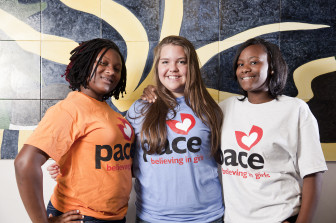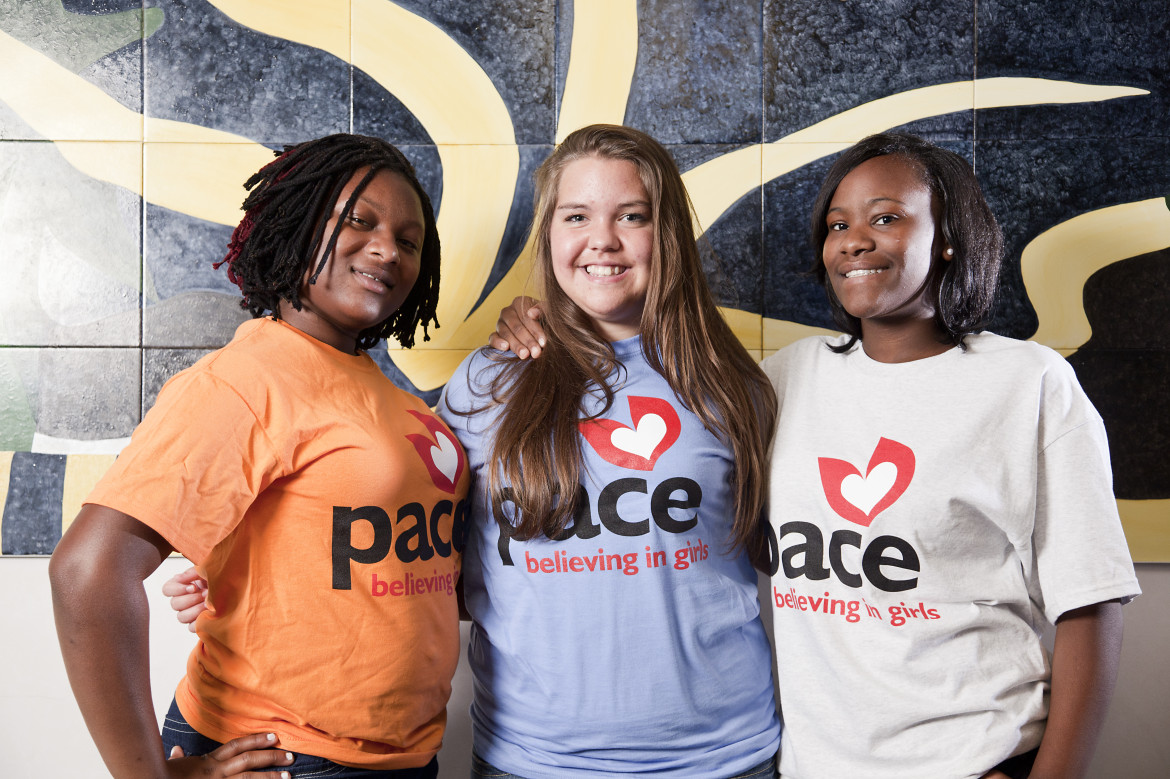
Photo courtesy PACE
“Every girl should have an opportunity to change,” says Aggie Pappas, executive director of one of the 18 PACE centers currently in Florida.
A Florida program created in 1985 for girls who had a brush with the law has now developed into a highly successful intervention program.
PACE Center for Girls was called "the most effective program in the nation for keeping adolescent girls out of the juvenile justice system” by the Annie E. Casey Foundation in its 2008 Kids Count report. The report pointed to PACE as a national model.
What makes a difference at PACE? "It really is the small, intimate, strengths-based, gender-responsive environment," said President and CEO Mary Marx.
PACE recognizes that trauma drives girls' behavior, Marx said. Girls who get arrested are very likely to have undergone traumatic experiences, she said. They are likely to have suffered neglect or physical or sexual abuse. The outside signs of this are failure in school. With boys, there is less of a history of sexual abuse.
The program uses a gender-specific approach that looks at the particular needs of girls, and it fosters girls' strengths, she said.
Now PACE is considering expanding into other states, including Georgia and Oklahoma. In Florida it will increase its locations from 18 to 20 by 2016, Marx said. Currently the program has a waiting list of 700 girls.
"The ways boys manifest trauma is different from how girls manifest trauma," Marx said. Girls tend to do self-destructive things such as abuse drugs and run away, she said. They may engage in "cutting" or have mental health issues, she said. Boys are more likely to react by becoming aggressive, committing theft or assault, for example, she said.
The juvenile justice system has dealt with girls by locking them up for offenses such as running away, she said. It was seen as a way to protect them.
But "girls whose behaviors were based on a past history of abuse were further traumatized in detention centers," Marx said. Girls could be put in isolation, be supervised by male guards and could become involved in abusive relationships, she said.
The result is that girls would react aggressively and move further into the juvenile justice system, she said. “Girls needed to be treated differently,” Marx said.
PACE was founded in 1985 by Vicki Burke, who started the program with 10 girls in Jacksonville, Fla. She saw that girls were being placed in programs geared to boys or kept in detention longer.
"She very much recognized that girls needed to be treated differently and there was a difference in the behavior that was driving them to be arrested," Marx said.
PACE provides schooling in its nonresidential centers, but it also offers a full plate of services. Girls go through a life skills class known as the Spirited Girls Curriculum. It focuses on positive decision-making, communications and other skills. In groups, girls get support in developing healthy relationships. A lot of time is spent on issues of self-respect and self-confidence and issues of sexuality, Marx said.
A girl’s case manager or counselor seeks to engage her family in her progress. Because many girls who have delinquent behavior are also in conflict with their mothers, the goal is to re-establish a good relationship and rebuild trust between mothers and daughters.
The case manager or counselor visits the girl's home and meets monthly with parents or guardians and provides referrals to community resources.
PACE becomes the family the girls don’t necessarily have,” Marx said.
Monique, who entered PACE as a tenth-grader, credits the program for helping her gain confidence in herself. She began to mentor other girls while she was there and she was also accepted into an arts-based confidence-building program at Young At Art Museum in Davie, Fla., called Girls N Power. She spent 18 months at PACE and graduated with honors. She received a two-year scholarship to Broward College in Fort Lauderdale.
Girls also volunteer in the community to gain more of a connection with their community. PACE provides career exploration and helps girls develop a plan for transition out of the program. After a girl leaves, her transition counselor contacts her every month for a year. For the next two years, the counselor contacts her every three months.
Aggie Pappas, executive director of the PACE center in Broward County, has been with the program 22 years. “I know it works,” she said.
“We are still in touch with women now in their 30s who came through our program [years ago],” she said. Some have told her they are parenting their children differently based on what they learned at PACE.
Pappas believes that every girl who needs help and wants help should be able to get it. To that end, the Broward center offers free therapy for girls and their families in the community, in addition to the girls enrolled in the program.
“Every girl should have an opportunity to change,” she said.
Current figures from PACE and the Florida Department of Juvenile Justice show that 92 percent of girls completing the program had no further involvement with the justice system a year later. Sixty-four percent of girls went back to high school or enrolled in college, according to PACE and the Florida Department of Education.
PACE is also in the middle of a rigorous assessment of its model. The research and evaluation firmMDRC is expected to have preliminary results in 2016.
Girls entering PACE range in age from 11-17 and stay an average 12-15 months in the program, Marx said. Each location has an average of 50 girls. Last year, 2017 girls went through the program.
Three-fourths of the girls who come to PACE are considered at risk for involvement in the justice system. More than one-fourth already have some charge against them, Marx said. Thirty percent have run away at least once. Twenty-six percent have dropped out of school. Seventy percent have failed at least one class.
Girls are often referred by juvenile court judges or the Florida Department of Children and Families.
The state Department of Juvenile Justice provides 44 percent of PACE’s funding, according to the organization’s annual report. Twenty-one percent comes from local school districts. Most of the remainder is from grants and contributions.
Financial supporters of JJIE may be quoted or mentioned in our stories. They may also be the subjects of our stories.
